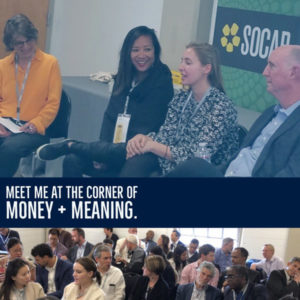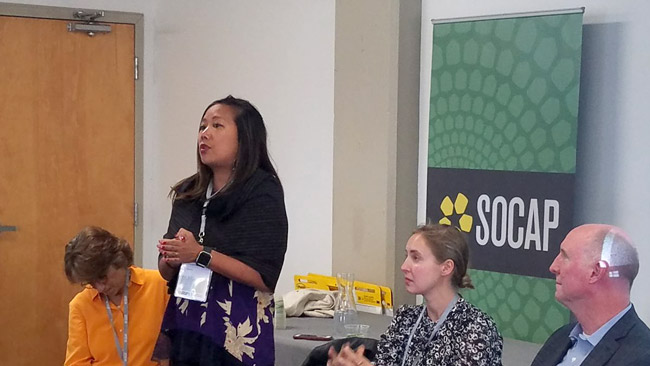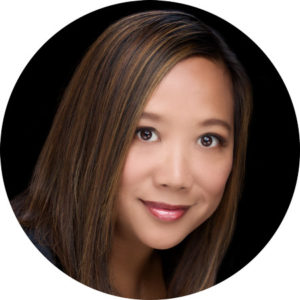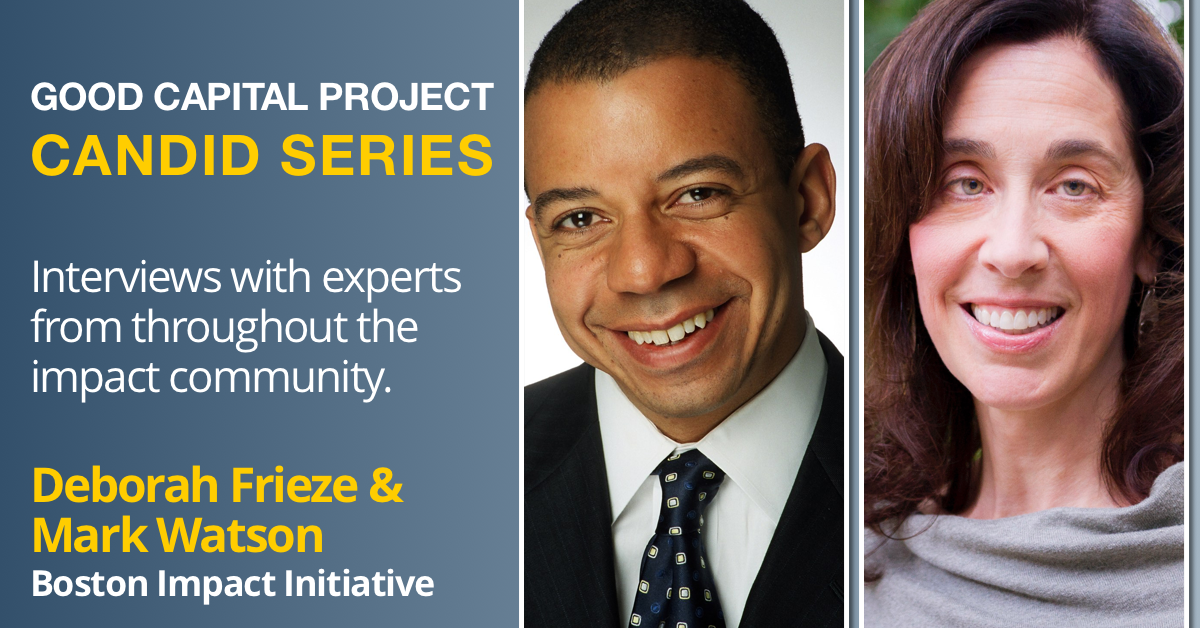To bring more of the SOCAP Community into the conversation, we invited SOCAP18 session leaders, speakers, and attendees to share their major insights and takeaways from the conference. Fascinated by The Climate Ribbon experience – an arts ritual where visitors are asked to write on a ribbon what they love and hope to never lose to climate chaos, I clung to my Sharpie and wrote, “The comfort and community found in simple green spaces.”
Fascinated by The Climate Ribbon experience – an arts ritual where visitors are asked to write on a ribbon what they love and hope to never lose to climate chaos, I clung to my Sharpie and wrote, “The comfort and community found in simple green spaces.”
As I tied my ribbon to this beautiful ribbon tree of sorts, I could actually visualize the green space to which I aspire and feel the blades of grass under my feet – less like a carpet and more like singular tickles that wake my toes up one cat-cow stretch at a time.
Earlier that same week, I was introduced to the concept of the “solo sit,” this notion that we should all have a go-to spot where we can be alone with our thoughts, slow down the pace of processing, and tap open the space of curiosity. And in the overwhelm of the conference, I found a bit of my solo sit on the pier of Fort Mason gazing into the dazzling water and the big blue sky.
 There I felt the power of the world meaning the world to me – not only as it relates to our precious earth, but also as it relates to the people and communities that walk upon it. There I was reminded of these key insights from the SOCAP movers and shakers, including my fellow panelists on REDF’s conversation entitled “Social Enterprise: An Investment that Works.”
There I felt the power of the world meaning the world to me – not only as it relates to our precious earth, but also as it relates to the people and communities that walk upon it. There I was reminded of these key insights from the SOCAP movers and shakers, including my fellow panelists on REDF’s conversation entitled “Social Enterprise: An Investment that Works.”
Happy people make people happy.
The key to vital business is a vital workforce – people who enjoy what they do and feel valued for their talent. “Everything tastes better when the people serving you are happy to be there,” shared Emma Rosenbush, Managing Partner of Cala, a fine dining restaurant in San Francisco (which was delish btw), employing returning citizens as part of their front of house team, and equalizing the playing field in the restaurant industry by removing the hierarchy between front of house and back of house and deeply investing in their talent – not just with skills, but also with premium benefits like fully covered healthcare.
People who work full time shouldn’t have to have a side gig to get out of poverty.
Kat Taylor, Co-Founder and CEO of Beneficial State Bank inspiringly shared, “We pay 150% of minimum wage, fully benefitted to all front line employees in an industry where many bank tellers are on some form of public assistance.” They are living out their organizational values as a triple bottom line firm focused on harnessing their power as an employer – above and beyond their role as a community bank – to create long-lasting good.
Forget maximization and imagine optimization.
Also from the main stage, where her backwards baseball cap just added to her sense of everyday cool, Beneficial State Bank’s Taylor unabashedly declared, “We are an optimization model. We don’t believe in maximization for any of our stakeholders (which includes the communities in which we invest).” What she means by optimization is that when a particular opportunity or transaction looks great on paper – but doesn’t serve all three pillars of people, planet, and profit – then the firm walks away from the deal.
This optimization framework connected for me, because at Cara, an organization which uplifts people and communities through the power of employment, we invite people to consider that, while the private sector focuses on maximizing shareholder value, social enterprises focus on maximizing dream-holder value, ensuring that people affected by the multiple dimensions of poverty have the access and opportunity they need to pursue their dreams. Perhaps the next generation of this thinking is to pivot towards optimization – not maximization in any one direction but optimization of a greater community whole.
What we have done or what has been done to us doesn’t define who we are.
Katie Lorish, Director of Operations of AnnieCannons, whose mission it is to help human trafficking survivors obtain a sustainable income through coding, challenged the subconscious bias we have in assuming what survivors cannot do for themselves because of their victimization.
AnnieCannons trumps that bias through their services that assume from the beginning their participants’ capacity is limitless. So often the labels we superimpose on people become the boundary of their capacity – giving their misfortune this amplified power that ultimately victimizes them all over again. I found kindred spirit with AnnieCannons in that they share our belief that our job is less to train people, and more to unlock the great gifts they already have within.
 After an exhaustive and engaging few days at SOCAP, I was reminded that what keeps drawing me back to this work is the fact that it’s a beautiful mess. That the power of social enterprise is giving voice and vocation to people who have been knocked off their square by the toxicity of poverty – a toxicity that often dismantles people’s sense of worth because of a poverty of skills, relationships, or esteem. And that if we can galvanize a movement that says to this population “I see you,” as in “I see your talents. I see your inner awesome. I see your hopes. I see you,” then imagine how quickly we can make this invisible talent pool visible. Imagine what becomes possible for parents as they redefine possibility for their kids, and employers as they reevaluate talent for their future.
After an exhaustive and engaging few days at SOCAP, I was reminded that what keeps drawing me back to this work is the fact that it’s a beautiful mess. That the power of social enterprise is giving voice and vocation to people who have been knocked off their square by the toxicity of poverty – a toxicity that often dismantles people’s sense of worth because of a poverty of skills, relationships, or esteem. And that if we can galvanize a movement that says to this population “I see you,” as in “I see your talents. I see your inner awesome. I see your hopes. I see you,” then imagine how quickly we can make this invisible talent pool visible. Imagine what becomes possible for parents as they redefine possibility for their kids, and employers as they reevaluate talent for their future.
The fact that so many of the leaders at SOCAP sit at the intersection of profit and purpose puts this community uniquely in a position of influence – of finding the points at which the market demands can be meaningfully addressed by an often invisible talent pipeline, and of harnessing our collective power to optimize, not maximize, and see the greater good the greater world can feel and be as a result.
About the Author
 After 13 years in the insurance industry (with her last position leading the technology division for a $400m insurance firm), Maria Kim joined Cara in 2005. Her civic leadership includes service on the Cook County Commission on Social Innovation and board leadership at the EPIC Academy and Rebuilding Exchange. She was a fellow for Leadership Greater Chicago’s Class of 2008, served on the board for the Leadership Fellows Association in 2009 and 2010, was a 2012 American Marshall Memorial Fellow, and a 2013 TEDxMidwest Emerging Leader. Maria holds an MBA from the University of Chicago Booth School of Business.
After 13 years in the insurance industry (with her last position leading the technology division for a $400m insurance firm), Maria Kim joined Cara in 2005. Her civic leadership includes service on the Cook County Commission on Social Innovation and board leadership at the EPIC Academy and Rebuilding Exchange. She was a fellow for Leadership Greater Chicago’s Class of 2008, served on the board for the Leadership Fellows Association in 2009 and 2010, was a 2012 American Marshall Memorial Fellow, and a 2013 TEDxMidwest Emerging Leader. Maria holds an MBA from the University of Chicago Booth School of Business.
Additional Resources
- JaShawn’s Story – The Ripple Effect of Social Enterprise; REDF
- Banking with a Public Benefit
- Priest’s Answer to Gang Life Faces Hard Times; NPR
- The Third Law; Tamra Ryan, CEO, Women’s Bean Project
- In the Business of Change: How Social Entrepreneurs are Disrupting Business as Usual; Elisa Birnbaum, Co-founder, Publisher, Editor-in-Chief, SEE Change Magazine


